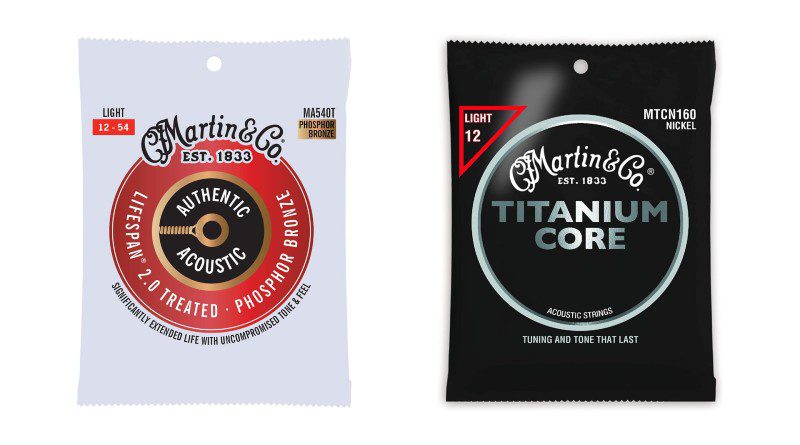With some guitar brands, there’s often debate and even mystery about what strings they ship their instruments with. Others, like Martin Guitar, announce these facts loud and proud.
It certainly makes sense that a premium manufacturer like Martin would share this information. After all, their master luthiers go to great lengths to create some of the world’s best guitars. Slapping any old set of strings on them absolutely wouldn’t do the instrument justice.
So, what strings do Martin guitars ship with? The answer is either Martin Authentic Acoustic Lifespan 2.0 in phosphor bronze medium gauge on low to midrange models. On high-end models like the D-45, you’ll get Martin’s Titanium Core Nickel Wound strings in a light gauge.
Like many other manufacturers, Martin produces their own guitar strings. Every instrument they make, whether a $300 Backpacker from the Mexico plant or a $30,000 custom dreadnought from a master luthier in Nazareth, PA, will arrive with Genuine Martin strings.
This information is always good to have, because if the sound you fell in love with when you bought your guitar is influenced by the stock strings, the only way to keep that consistent is to replace them like-for-like.
While the phosphor bronze Acoustic Lifespan 2.0s are fairly averagely priced, their special titanium core strings are upwards of $40 for a set of 6. If you aren’t looking to spend that much every string change, or if you’d just like to experiment with something different, keep reading as we explain how to select new strings, and some of the better options out there for your Martin Guitar.
By the way, if you’re a Martin fan, check out this killer book on the history of Martin Guitars!
Contents
How to Choose Guitar Strings
Strings are one of the single most cost-effective changes a player can make to their guitar. Unlike some mods with subjective sound benefits (I’m looking at you, saddle upgrades!), as little as $10 and half an hour of installation can have an enormous (and demonstrable) impact on both tone and playability.
When you’re choosing your new strings, there are a number of variables to choose from. Each will have an effect on the overall sound, reliability, and playability of your guitar.
String Gauge
Guitar strings aren’t measured in length. They’re measured in width, or diameter. Because their diameter is so small, manufacturers use an easy to understand, universal measure in order to let consumers know what size their strings are. That measurement is gauge.
You may hear guitarists saying, “I play 9s” or “I play 12s”. This number refers to the measurement of the thinnest string, usually high E. The thinnest string is usually the reference point for the entire package.
The gauge, or width, of the string is measured in 1/1000th of an inch. So in a set of 12s, which is typically a light gauge set for acoustic guitars like Martins, the high E would measure 0.012”. In a packet of Martin Acoustic Lifespan strings, like those that come on many Martins from the factory, the gauges are as follows: .012, .016, .025, .032, .042, .054, with .012 representing high E, and .054 representing low E.
Using the actual gauge of the string is generally better practice than using the descriptions, which are typically extra-light, light, medium, heavy, extra heavy. Each manufacturer uses those terms differently, so while Martin refers to 12s as light, Ernie Ball calls their 12s medium-light. But if you know you like 12s, that number is universal.
Do be aware, even if you do shop by the gauge, different manufacturers may use different gauges for the other strings in the packet. You can check this on the packaging.
Lighter strings typically have a lower volume output because they have less mass vibrating. On the other hand, lighter strings have better playability due to their lower tension. This makes them more comfortable than heavy strings and also makes bends and vibrato easier to play.
Heavier strings benefit from a fatter tone and better sustain, again due to their increased mass over lighter strings, which tend to sound thinner and have less sustain.
String Material
Another important factor in the tone and playability of acoustic guitar strings is the material from which they are made. Most strings have a steel core wire, which may either be round or hexagonal. The core shape’s impact on tone is subjective, but hex core strings do tend to have better tuning stability due to their improved grip on the wrap wire.
The core material in use does have an impact on vibration and sustain, however, and will also impact the tensile strength. Steel is cheap to produce and works well across most applications. Titanium, on the other hand, is a much more exotic core material. It’s as strong as steel, but much more flexible, making it more forgiving and comfortable to play.
Speaking of the wrap wire, the three bass-side strings are wound with a metal wrap wire. The material of the wrap wire is the difference maker when it comes to tone, sustain, and comfort.
- 80/20 Bronze – Bright and shimmering, but become dull quickly.
- Phosphor Bronze – A little richer and warmer than 80/20 with better longevity.
- Aluminum Bronze – Excellent bass response.
- Polymer Coated – Made from any of the typical materials, but treated with a coating that makes them smoother and provides a long lifespan.
- Silk and Steel – Some of the warmest and most mellow strings available.
Best Replacement Martin Acoustic Strings
If you love how your Martin sounds from the factory, you should probably look at replacing the strings like-for-like. In the case of Mexican-made Martins, this will be the medium gauge Martin Lifespan 2.0 Phosphor Bronze. If you own a US-made Martin, you’ll be replacing your strings with Martin Titanium Core light gauge strings.
If you’re looking to branch out and try something new, take a look at our Best Acoustic Guitar Strings writeup for a detailed description of the best acoustic strings on the market. Here’s a quick rundown of some of our favorites that will work well for any Martin acoustic:
If you’re looking for a high-end coated string with the bright character of 80/20 bronze, these Elixir 80/20 Nanowebs in medium gauge (13-56) are some of the best. The coating is so thin, you might not notice it’s there at first, but you’ll absolutely notice the difference in the life of your strings.
Folk players will really enjoy the rich warmth of these Martin SP Silk and Steel strings in custom gauge (11.5-47). They’re made with classic Martin quality, and they truly come alive with fingerstyle playing.
Anybody looking for a no-nonsense, inexpensive, yet great sounding bronze string with sparkling highs and incredible projection need look no further than the Ernie Ball Earthwood in medium (13-56).
Final Thoughts
As I said at the beginning of this writeup, strings are a great way to experiment with the sound capabilities of your Martin without making any permanent changes or risking any real damage to the guitar. Of course, if you do change the gauge of your string from the factory specs, remember to perform a setup to ensure your neck relief is set correctly for the new string tension.
Check out these other articles you might like:
- Our guides for the strings on Fender, Yamaha, Taylor, Gretsch and Epiphone LP guitars
- How to Restring an Acoustic Guitar
- Our Guide to the Best Electric Guitar Strings
- Flatwound vs Roundwound Strings – Key Differences
- How to Remember the Names of Each Guitar String


